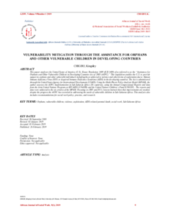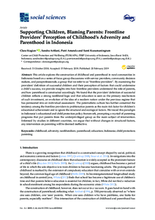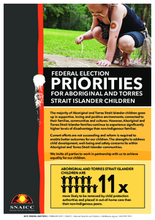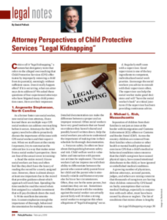Displaying 411 - 420 of 1796
This paper analyzes the United States of America (U.S). House Resolution 1409 (H.R.1409) also referred to as the “Assistance for Orphans and Other Vulnerable Children in Developing Countries Act of 2005 (AOVC).”
This open access article explores the construction of childhood and parenthood in rural communities in Indonesia based on a series of focus group discussions with service providers, community decision makers, and paraprofessionals; a group that the authors refer to as “frontline providers”.
Using synthesis and an integrative approach, the article analyzes laws, policies, and institutions that protect the rights and promote the welfare of orphaned children in the Philippines.
This paper sets out to give a rounded view of the Irish foster care system as currently constituted.
This study explores the lived experience of child welfare worker turnover from the child's perspective, adding an important and underrepresented voice in the literature.
This brief from SNAICC – National Voice for our Children highlights the issue of the disproportional numbers of Aboriginal and Torres Strait Islander children in out-of-home care in Australia, which has reached "national crisis proportions," and outlines key steps that need to be taken to address this issue.
For this legal note, four experienced attorneys who have litigated many child protection cases were asked about the alleged overreaching that US Child Protective Services (CPS) effectuates by improperly removing a child from its parent(s), seemingly without sufficient cause.
In Wales, a significant body of work has been produced on and with care-experienced children and young people. This edited collection attempts to highlight these valuable insights in a single volume.
Communication skills are fundamental to social work, yet few studies have directly evaluated their impact. This study explores the relationship between skills and outcomes in 127 families.
This article outlines the arguments made in recent litigation undertaken by the Public Interest Advocacy Centre (PIAC) on behalf of young people who requested access to legal audits conducted on their files by the New South Wales (NSW) Department of Family and Community Services (FACS).




